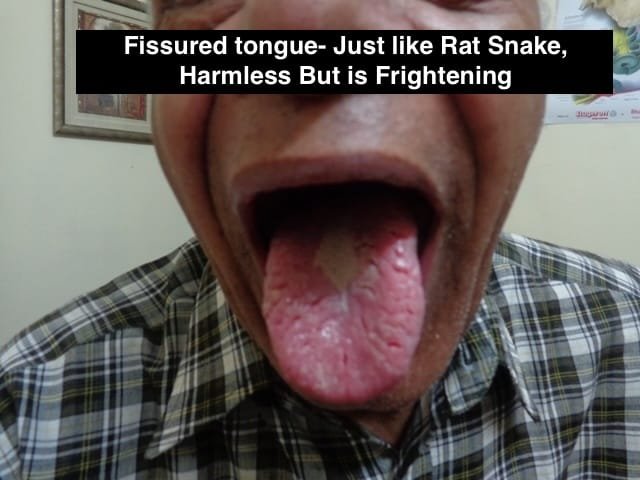What is a Fissured Tongue
Fissured tongue, also medically known as lingua plicata or scrotal tongue, is a benign (non-cancerous) condition characterized by the presence of one or more grooves or furrows on the top surface of the tongue. These fissures can vary in depth and length, sometimes appearing as a single prominent groove down the middle, while other times presenting as a network of interconnected lines that divide the tongue into smaller segments or “islands.”
Imagine the surface of your tongue as a terrain – a fissured tongue is like a landscape carved with valleys and ridges. It’s a structural variation of the tongue, not a disease or infection.
What Causes Fissured Tongue?
The exact cause of fissured tongue isn’t fully understood, but several factors are believed to play a role:
- Genetics: This is considered the most significant factor. Fissured tongue often runs in families, suggesting a strong genetic predisposition. If your parents or grandparents have it, there’s a higher chance you might too.
- Age: The condition tends to become more pronounced with age. As we get older, the fissures may deepen and become more noticeable.
- Association with Other Conditions: Fissured tongue is frequently seen alongside other conditions, most notably:
- Geographic Tongue: Many individuals with geographic tongue also have a fissured tongue.
- Down Syndrome: Fissured tongue is very common in individuals with Down syndrome.
- Melkersson-Rosenthal Syndrome: This is a rare neurological disorder characterized by recurrent facial paralysis, swelling of the face and lips, and fissured tongue.
- Psoriasis: There’s an increased incidence of fissured tongue in people with psoriasis, an autoimmune skin condition.
- Irritation/Trauma (Less Common): While not a primary cause, chronic irritation might potentially exacerbate existing fissures or contribute to their prominence in some cases.
It’s crucial to remember that fissured tongue is not contagious and is not a sign of poor hygiene or a serious underlying illness in most cases.
Symptoms of Fissured Tongue
For the vast majority of people with a fissured tongue, there are no symptoms at all. The condition is often discovered incidentally during a routine dental check-up or when someone simply notices it in the mirror.
However, in some rare instances, or if proper oral hygiene isn’t maintained, individuals might experience:
- Trapped Debris: Food particles, bacteria, and dead cells can sometimes get lodged within the deeper grooves. If not cleaned properly, this can lead to:
- Mild Irritation: A slightly uncomfortable or itchy sensation.
- Halitosis (Bad Breath): Due to the accumulation of bacteria.
- Slight Sensitivity: Very occasionally, highly acidic or spicy foods might cause a fleeting sensitivity in the deeper fissures, but this is uncommon.
It’s important to note that a fissured tongue itself does not cause pain or burning unless it becomes irritated due to trapped debris or an associated condition like geographic tongue.
Diagnosis and When to See a Doctor
No special tests or procedures are usually needed as its appearance is quite distinctive.
While generally harmless, it’s always a good idea to mention any new or concerning changes in your mouth to your healthcare provider. You should definitely consult a doctor or dentist if:
- You experience persistent pain, burning, or discomfort on your tongue.
- The fissures become inflamed, swollen, or develop white or red lesions that don’t go away.
- You notice any other unusual changes in your mouth or tongue that concern you.
- You’re experiencing significant bad breath that can’t be resolved with regular brushing and flossing.
These symptoms could indicate another underlying condition that requires attention.
Managing Fissured Tongue
Since fissured tongue is usually asymptomatic and harmless, it rarely requires specific medical treatment. The primary focus of management is good oral hygiene to prevent any potential issues arising from trapped debris.
Here are some tips:
- Thorough Tongue Cleaning: This is the most important step. When you brush your teeth, gently brush the surface of your tongue as well. A soft-bristled toothbrush can be very effective in removing food particles and bacteria from the fissures.
- Maintain Excellent Oral Hygiene: Regular brushing and flossing of your teeth are crucial for overall oral health, which indirectly benefits your tongue.
- Rinse After Eating: A quick rinse with water after meals can help dislodge food particles from the grooves.
- Stay Hydrated: Drinking plenty of water helps maintain saliva flow, which naturally cleanses the mouth.
- Avoid Irritants (If Sensitive): If you find certain foods (like highly acidic or spicy ones) irritate your tongue, try to limit their consumption. This is more common when fissured tongue co-exists with geographic tongue.
Living with Fissured Tongue
Having a fissured tongue is simply a unique anatomical feature for most people. It’s not a sign of ill health, and it doesn’t impact your ability to speak, eat, or taste. While its appearance might seem unusual, it’s rarely a cause for concern.
Embrace your tongue’s distinct pattern, and simply make sure to keep it clean! If you ever have any worries or notice new symptoms, don’t hesitate to reach out to your dental or medical professional for reassurance and guidance.


Recent Comments